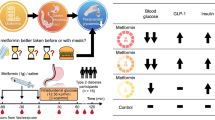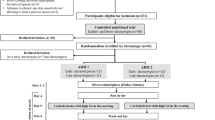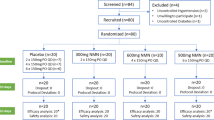Abstract
Background
Ingestion of ethanol before a glucose challenge enhances the insulin response by an unknown mechanism. In addition, epidemiological studies consistently indicate that moderate alcohol consumption reduces the risk of developing type 2 diabetes (T2D). The purposes of this study were to evaluate the potential involvement of glucose-dependent insulinotropic peptide (GIP) and glucagon-like peptide 1 (GLP-1) in alcohol-induced augmentation of the insulin response and to determine if red wine acutely improves glucose tolerance during an oral glucose tolerance test (OGTT).
Methods
Nine subjects (eight T2D and one pre-diabetes) completed two OGTT 30 min after consumption of 263 ml water or red wine (28 g ethanol). Blood samples were obtained for 3 h and analyzed for glucose, insulin, C-peptide, GIP, and GLP-1.
Results
Compared with water, consumption of red wine increased the incremental area under the curve (iAUC) for insulin by 50 % (14,837 ± 4759 vs. 9885 ± 2686 µU/ml × min; p < 0.05) and for GIP by 25 % (7729 ± 1548 vs. 6191 ± 1049 pmol/l × min; p < 0.05). Glucose and GLP-1 responses were not affected by red wine.
Conclusion
Wine consumption before an OGTT augments the insulin response, which may be partially driven by a greater GIP response. Because glucose levels were not reduced, acute wine consumption may not be effective treatment for enhancing glycemic control or may need to be combined with therapy that improves insulin sensitivity.






Similar content being viewed by others
References
Ohtsubo K, Chen MZ, Olefsky JM, et al. Pathway to diabetes through attenuation of pancreatic beta cell glycosylation and glucose transport. Nat Med. 2011;17:1067–75.
Holst JJ, Knop FK, Vilsbøll T, et al. Loss of incretin effect is a specific, important, and early characteristic of type 2 diabetes. Diabetes Care. 2011;34:S251–7.
Mikus CR, Oberlin DJ, Libla J, et al. Glycaemic control is improved by 7 days of aerobic exercise training in patients with type 2 diabetes. Diabetologia. 2012;55:1417–23.
Buelens JWJ, Stolk RP, van der Schouw YT, et al. Alcohol consumption and risk of type 2 diabetes among older women. Diabetes Care. 2005;28:2933–8.
Conigrave KM, Hu BF, Camargo CA Jr, et al. A prospective study of drinking patterns in relation to risk of type 2 diabetes among men. Diabetes. 2001;50:2390–5.
Hodge AM, English DR, O’Dea K, et al. Alcohol intake, consumption pattern and beverage type, and the risk of type 2 diabetes. Diabetic Med. 2006;23:690–7.
Wannamethee SG, Camargo CA Jr, et al. Alcohol drinking patterns and risk of type 2 diabetes mellitus among younger women. Arch Intern Med. 2003;163:1329–36.
Cordain L, Melby CL, Hamamoto AE, et al. Influence of moderate chronic wine consumption on insulin sensitivity and other correlates of syndrome X in moderately obese women. Metabolism. 2000;49:1473–8.
Beulens JWJ, van Beers RM, Stolk RP, et al. The effect of moderate alcohol consumption on fat distribution and adipocytokines. Obesity. 2006;14:60–6.
Christiansen C, Thomsen C, Rasmussen O, et al. Acute effects of graded alcohol intake on glucose, insulin, and FFA levels in non-insulin dependent (NIDDM) subjects. Eur J Clin Nutr. 1993;47:648–52.
Christiansen C, Thomsen C, Rasmussen O, et al. The acute impact of ethanol on glucose, insulin, triacylglycerol, and free fatty acid responses and insulin sensitivity in type 2 diabetes. Br J Nutr. 1996;76:669–75.
Trojan N, Pavan P, Iori E, et al. Effect of different times of administration of a single ethanol dose on insulin action, insulin secretions and redox state. Diabetic Med. 1999;16:400–7.
Nikkilä EA, Taskinen MR. Ethanol-induced alterations of glucose tolerance, postglucose hypoglycemia, and insulin secretion in normal, obese, and diabetic subjects. Diabetes. 1975;24:933–43.
Adner N. Influence of naloxone, atropine, and metoclopramide on ethanol augmentation of insulin secretion after intravenous glucose stimulation. Pancreas. 1990;5:460–6.
Adner N. The influence of indomethacin, theophylline, and propranolol on ethanol augmentation of glucose-induced insulin secretion. Metabolism. 1992;41:1165–70.
Koivisto VA, Tulokas S, Toivonen M, et al. Alcohol with a meal has no adverse effects on postprandial glucose homeostasis in diabetic patients. Diabetes Care. 1993;16:1612–4.
Svartberg J, Holst JJ, Gutniak M, et al. The ethanol augmentation of glucose-induced insulin secretion is abolished by calcium antagonism with nifedipine: no evidence for a role of glucagon-like peptide-1 (GLP-1). Pancreas. 1998;16:66–71.
Abraham KA. Acute red wine consumption elevates plasma insulin and decreases plasma glucose in women during an oral glucose tolerance test. Int J Diabetes Metab. 2010;18:95–8.
Dalgaard M, Thomsen C, Rasmussen BM, et al. Ethanol with a mixed meal decreases the incretin levels early postprandially and increases postprandial lipemia in type 2 diabetic patients. Metabolism. 2004;53:77–83.
Wolever TM. Effect of blood sampling schedule and method of calculating the area under the curve on validity and precision of glycaemic index values. Br J Nutr. 2004;91:295–301.
Nauck M, Stöckmann F, Ebert R, et al. Reduced incretin effect in type 2 (non-insulin-dependent) diabetes. Diabetologia. 1986;29:46–54.
Koliaki C, Doupis J. Incretin-based therapy: a powerful and promising weapon in the treatment of type 2 diabetes mellitus. Diabetes Ther. 2011;2:101–21.
Meier JJ. The contribution of incretin hormones to the pathogenesis of type 2 diabetes. Best Pract Res Clin Endocrinol Metab. 2009;23:433–41.
Polichiewicz AN, Chaikomin R, Brennan IM, et al. Load-dependent effects of duodenal glucose on glycemia, gastrointestinal hormones, antropyloroduodenal motility, and energy intake in healthy men. Am J Physiol Endocrinol Metab. 2007;293:E743–53.
Franke A, Nakchbandi IA, Schneider A, et al. The effect of ethanol and alcoholic beverages on gastric emptying of solid meals in humans. Alcohol Alcohol. 2005;40:187–93.
Franke A, Teyssen S, Harder H, et al. Effect of ethanol and some alcoholic beverages on gastric emptying in humans. Scand J Gastroenterol. 2004;39:638–44.
Kasicka-Jonderko A, Jonderko K, Bozek M, et al. Potent inhibitory effect of alcoholic beverages upon gastrointestinal passage of food and gallbladder emptying. J Gastroenterol. 2013;48:1311–23.
Yoder SM, Yang Q, Kindel TL, et al. Differential responses of the incretin hormones GIP and GLP-1 to increasing doses of dietary carbohydrate but not dietary protein in lean rats. Am J Physiol Gastrointest Liver Physiol. 2010;299:G476–85.
Škrha J, Holgertova J, Jarolimkova M, et al. Meal test for glucose-dependent insulinotropic peptide (GIP) in obese and type 2 diabetic patients. Physiol Res. 2010;59:749–55.
Wolever TMS, Chiasson J-L, Csima A, et al. Variation of postprandial plasma glucose, palatability, and symptoms associated with a standardized mixed test meal versus 75 g oral glucose. Diabetes Care. 1998;21:336–40.
Exebio JC, Ajabshir S, Zarini GG, et al. Use of homeostatic model assessment indexes for the identification of metabolic resistance and insulin resistance among Cuban-Americans: a cross-sectional study. Br J Med Medical Res. 2014;4:4824–33.
Geloneze B, Vasques ACJ, Stabe CFC, et al. HOMA1-IR and HOMA2-IR indexes in identifying insulin resistance and metabolic syndrome—Brazilian metabolic syndrome study (BRAMS). Arq Bras Endocrinol Metab. 2009;53:281–7.
Gin H, Morlat P, Ragnaud JM, et al. Short-term effect of red wine (consumed during meals) on insulin requirement and glucose tolerance in diabetic patients. Diabetes Care. 1992;15:546–8.
Gin H, Rigalleau V, Caubet O, et al. Effects of red wine, tannic acid, or ethanol on glucose tolerance in non-insulin-dependent diabetic patients and on starch digestibility in vitro. Metabolism. 1999;48:1179–83.
Su H-C, Hung L-M, Chen J-K. Resveratrol, a red wine antioxidant, possesses an insulin-like effect in streptozotocin-induced diabetic rats. Am J Physiol Endocrinol Metab. 2006;290:E1339–46.
Baggio LL, Drucker DJ. Biology of incretins: GLP-1 and GIP. Gastroenterol. 2007;132:2131–57.
Acknowledgments
We thank Ying Liu, Jin Yan, Abby Felthaus, and Chelsea Diamond for their technical assistance. This research was supported by the Kenan Fund for student and faculty development at Transylvania University (KAA) and National Institutes of Health T32-AR048523 (LJR).
Author information
Authors and Affiliations
Corresponding author
Ethics declarations
Conflict of interest
The authors declare that they have no conflict of interest.
Ethics policy
All procedures followed were in accordance with the ethical standards of the responsible committee on human experimentation (institutional and national) and with the Helsinki Declaration of 1964 and later versions. Informed consent or a substitute for it was obtained from all patients before inclusion in the study.
About this article
Cite this article
Abraham, K.A., Kearney, M.L., Reynolds, L.J. et al. Red wine enhances glucose-dependent insulinotropic peptide (GIP) and insulin responses in type 2 diabetes during an oral glucose tolerance test. Diabetol Int 7, 173–180 (2016). https://doi.org/10.1007/s13340-015-0234-y
Received:
Accepted:
Published:
Issue Date:
DOI: https://doi.org/10.1007/s13340-015-0234-y




